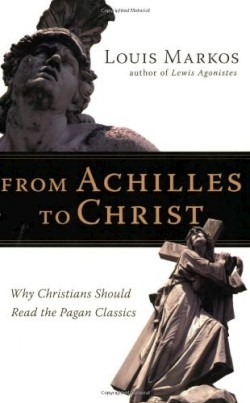It looks like you've stumbled upon a page meant to be read by our code instead of viewed directly. You're probably looking for this page.
From Achilles to Christ
Why Christians Should Read the Pagan Classics
In the second century, the Christian theologian Tertullian famously asked, “What does Athens have to do with Jerusalem?” Although Tertullian answered his own question with a resounding “No!” other early Christian writers, especially Clement of Alexandria and Augustine, proclaimed that Greek and Latin literature compared favorably with Christian literature, and that Christians should by all means read Cicero and Greek novels and romances, such as the Alexandriad.
Louis Markos, who teaches English at Houston Baptist University, falls somewhere between Tertullian and Augustine in this noble, but flawed, attempt to demonstrate that Christians can enhance their faith by a “vigorous interaction with the central literary masterpieces of the ancient world.”
Markos engages in sometimes brilliant, often pedestrian, close readings of Homer, Virgil, Aeschylus, Sophocles, and Euripides searching for themes and images in these writings that can inspire Christians to view their biblical canon with new eyes. For example, Markos reads Homer’s Odyssey, at least in part, as an epic whose dispassionate and impersonal gods prepare the conceptual way for the passionate and personal God of the Bible. In the Aeneid, according to Markos, Virgil provides a glimpse of a divine purpose for humanity, but such a purpose can only be revealed fully in Christianity when humankind is willing to sacrifice its own immediate desires and trust God’s promises.
While Markos’s efforts to recover the ancient classics for Christians are admirable, they are ultimately faulty. His use of the outdated phrase “pagan classics” in the subtitle indicates right away his view that these writings are inferior to Christian writings. “Pagan” carries negative connotations and indicates that Greek and Roman literature cannot be read for its own sake but must be somehow redeemed and completed by Christian literature. Markos does not read the works on their own merits, only for how they provide a foreshadowing of events and themes in the biblical texts. Aeneas, for example, becomes a pre-Christian Jonah. God “at times speaks through the mouth of the pagan: to announce the coming Messiah (the Fourth Ecologue of Virgil) or to attest to the hidden nature of sin and the need for a scapegoat (Oedipus).” Yet sin isn’t even a concept for Sophocles. In Markos’s readings, these “pagans” yearn to be Christians, and their literature demonstrates it. In his attempts to demonstrate the worthiness of reading Greek classics, he denigrates them at the same time.
Despite of Markos’s clearly apologetic tone (only Christian literature contains the real truth about God and the world), he does provide a clear and helpful introduction to the Greek classics for Christians who might have always wondered how the reading of Homer or Virgil might effect to their faith.
Reviewed by
Henry L. Carrigan
Disclosure: This article is not an endorsement, but a review. The publisher of this book provided free copies of the book to have their book reviewed by a professional reviewer. No fee was paid by the publisher for this review. Foreword Reviews only recommends books that we love. Foreword Magazine, Inc. is disclosing this in accordance with the Federal Trade Commission’s 16 CFR, Part 255.
